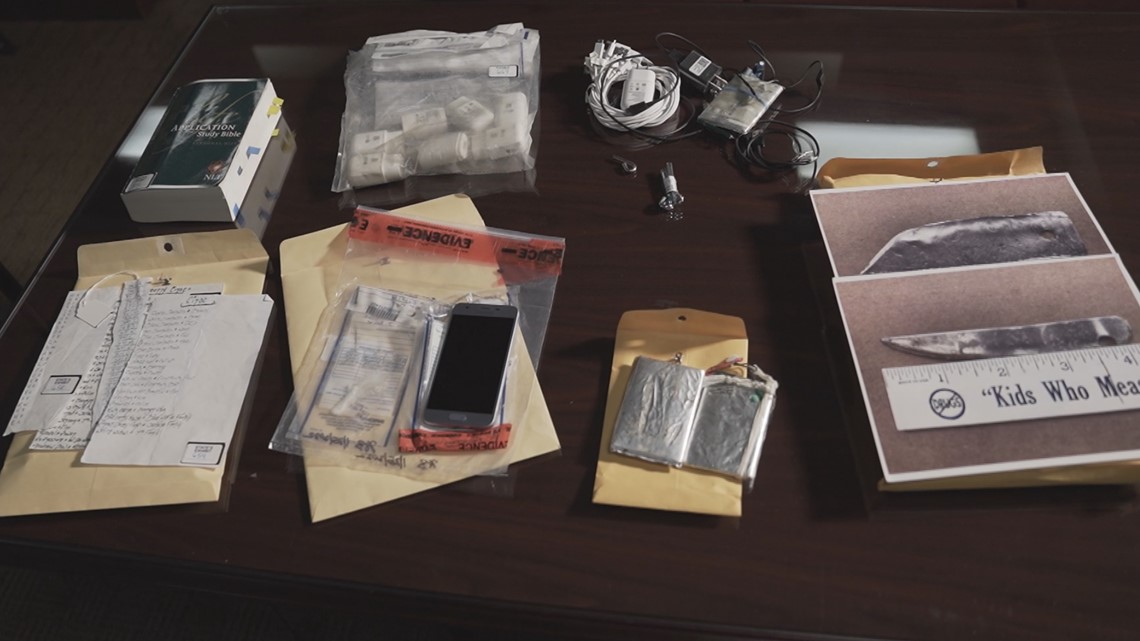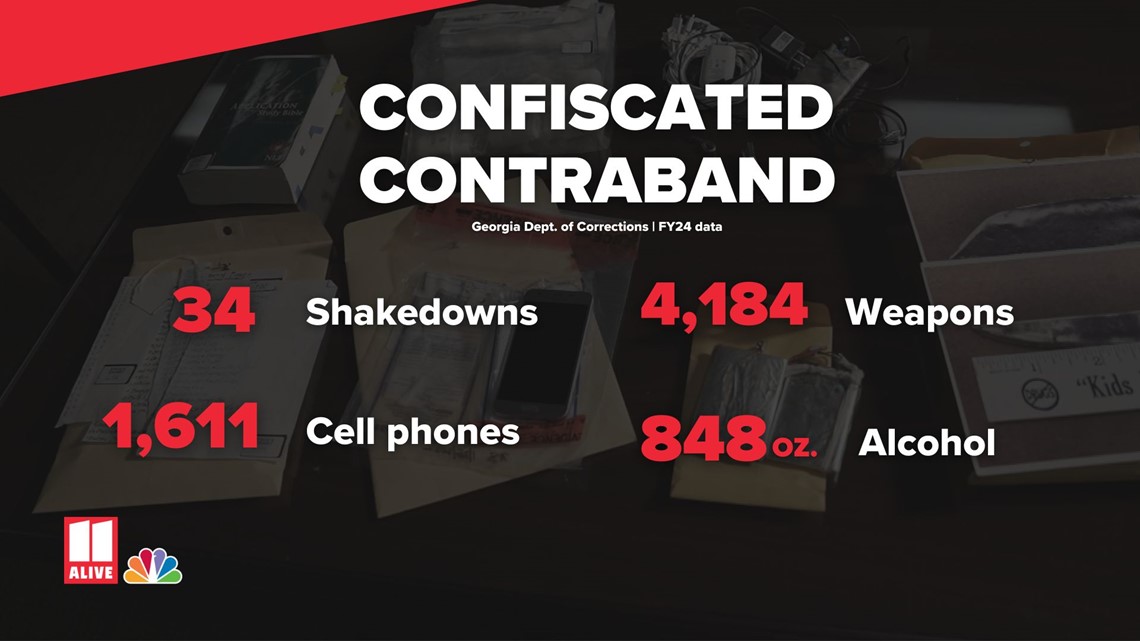Convicts and Corrections Officers Are In Grave Danger
Georgia Cannot Hire and Recruit New Officers in a Cesspool of Corruption!
The Georgia Department of Corrections Needs the National Guard to Protect Inmates and Staff!
ATLANTA
When people are convicted and sentenced in Georgia's courts, many are taken into state custody and housed inside the state prison system. While there, the state implicitly agrees to keep both staff and detainees safe while they serve their time.
It's a tough promise to keep. An 11Alive investigation has revealed Georgia’s prison system is struggling to control and protect those incarcerated in its care amidst plummeting staff levels.
People inside the system’s walls often face an environment where contraband and violence are commonplace.
Even one of Georgia's most secure prison facilities is not immune.
From detainees dying months shy of the end of their sentences to widespread contraband and systemwide staffing struggles - this is just a glimpse of the growing problem.
THE SPECIAL MANAGEMENT UNIT
Early one June morning in 2017, a pair of Georgia Department of Corrections (G.D.O.C.) inmates staged a violent escape.
Ricky Dubose and an accomplice broke free of their restraints while riding a prisoner transport bus through Putnam County. They killed the two guards onboard, left the scene, and led law enforcement on a multistate manhunt.
“It was a nonstop 72-hour crime spree until they were arrested,” said Putnam County Sheriff Howard Sills.
Eventually, the pair were captured in Tennessee. Once transferred back into Georgia custody, Dubose was sent to the Special Management Unit in Butts County, according to Ocmulgee Judicial Circuit District Attorney Wright Barksdale.
“The S.M.U. unit is by design to house the baddest of the bad,” said Barksdale. “The worst of the worst.”
But even there, Dubose proved difficult to manage.
In an interview, Barksdale displayed a table covered in contraband he said Dubose was able to obtain while housed at the S.M.U.

 Credit: 11Alive Investigators
Credit: 11Alive Investigators
Drugs, phones, knives - Barksdale said Dubose had them all.
“He’s in supposedly what’s the most secure place in the state and I can’t tell you how many telephones he had,” said Sheriff Sills. “He had knife blades. He had fashioned handcuff keys.”
The G.D.O.C. did not accept 11Alive's request for an interview for this story and did not directly answer questions pertaining to the contraband Barksdale said was found in Dubose's possession at the S.M.U.
Instead, a G.D.O.C. spokesperson sent a written statement saying that “contraband, most notably cell phones, presents a serious challenge within all correctional systems.”.
She described a prison system where contraband poses a challenge statewide.
Department of Corrections statement:
"Through continuous facility shakedowns (34 thus far during FY24) and collaboration with our local law enforcement partners, we work every day to keep dangerous contraband out of or removed from our facilities. As a result of the shakedowns in FY24, 1,611 cell phones, 4,184 weapons, more than 848 oz alcohol, 2 grams cocaine, 2,164 grams methamphetamine, 1,485 pills, 15,374 grams THC, and 35,190 grams tobacco were confiscated from prison facilities statewide."

 Credit: 11Alive
Credit: 11Alive
Records obtained from the Department of Corrections indicate that 20 corrections officers assigned to the Special Management Facility have been fired since 2021.
"That's an alarming number," said Sheriff Sills.
In one incident, a guard was terminated after opening “the wrong door” while a prison system leader was conducting rounds, “resulting in an inmate exiting the cell and threatening to kill the Deputy Warden,” departmental records allege.
Records show the corrections officer admitted she opened the wrong door but said there was a reason she was inattentive.
“I decided to come to work on my off day to help my fellow officers out because I knew we were understaffed,” she wrote in her discipline proceeding. Despite a “bad migraine headache,” she came to work because she “knew the situation within the facility, and help was desperately needed.”
STAFFING CRISIS
Staff problems are not unique to the S.M.U.
In some cases, Barksdale said prison facilities are stretched so thin that one corrections officer is tasked with guarding an entire unit by themselves.
"It's the wild, wild west," he said.
According to the district attorney, both inmates and guards are put at risk.
To emphasize his point, Barksdale shared surveillance video of a 2017 murder inside Central Georgia’s Hancock State Prison.
“There was one female officer on a dorm with 96 inmates,” said Barksdale. “She weighed probably 130 pounds. She had a radio, a set of keys, and a baton.”
As four inmates attack another prisoner, video shows the guard running for safety.
“She was 10 feet away,” said Barksdale. “There was nothing she was going to be able to do about that.”
State records show that staff levels cratered over the last decade.
G.D.O.C. counted more than 6,500 correctional officers among its ranks in 2012. By 2022, that number had fallen to just over 2,500.
It’s a more than 60% decline in guards systemwide; at the same time, inmate populations have only fallen by about 15%.
In a statement, a spokesperson for the Department of Corrections wrote that staffing “is an issue not only in Georgia but across the country.” She noted that the agency is “always actively recruiting” and has “seen a net gain in the number of staff we are bringing on board vs. the number departing for 8 consecutive months.”
The statement went on to say that the majority of inmates in Georgia’s prisons are serving time for violent offenses, leading correctional officers to work among “some of the most dangerous ‘communities’ in Georgia,” creating additional recruiting challenges.
INMATES UNPROTECTED
Detainees inside the system face an environment where violence is not uncommon.
“When your loved ones go away, you think that they would be safe,” said Michael Archer. “But they’re not safe.”
He’s seen it firsthand.
Archer’s 26-year-old son, Ryan, was killed in December at Coastal State Prison near Savannah.
The Spalding County man had just six months left of his two-year sentence for nonviolent charges, according to the G.D.O.C.
The Department of Corrections confirms he died “as a result of an altercation with another inmate.”
Ryan Archer, incarcerated man killed months before end of sentence | PHOTOS
1/5×Provided
Ryan leaves behind a 6-year-old daughter who he was eager to reunite with, his father said.
“She is just like Ryan at that age," Michael said. “He was ready to move forward. He just didn’t get the chance.”
As a grandparent, Michael was looking forward to watching his son grow as a father.
"You want to be there for your son," said Michael. "And you're not there. And that's what really hurts."
Michael is not alone in his pain.
Between 2021 and 2023, the Department of Corrections recorded more than 3,500 “inmate-to-inmate” assaults. Records show 98 prisoners were killed.
“I wouldn't be past something as extreme as the National Guard coming in,” said D.A. Barksdale. “You’ve got some of these prisons that are so understaffed they need boots on the ground and they need them now.”
For Eutha Dorsey’s son, Martel, even that wouldn’t be enough.
“He was a very loving, caring person,” she said. “The situation that has happened is just senseless.”
She said her son was approved for early release and was waiting for paperwork that never came.
While serving a five-year sentence for nonviolent charges, the 32-year-old Atlanta man was killed at South Georgia’s Calhoun State Prison, according to the G.D.O.C.
Martel Dorsey | PHOTOS
1/5×Eutha Dorsey
According to his mother, he leaves behind a 10-year-old daughter.
The Department of Corrections confirms that “staff witnessed inmate Dorsey run out of the dorm as he was being chased by several other inmates.” He died from his injuries.
“Our loved ones made a mistake in life,” said Eutha Dorsey. “They have to go away and do their time. But at the same time, they deserve to come home.”
Statements from the Department of Corrections released at the time of both Dorsey and Archer’s deaths say both fatalities were being investigated by the department’s office of professional standards.
THE PATH FORWARD
The path forward
Both Sheriff Sills and D.A. Barksdale are now calling for change across Georgia's prison system.
"I see it as a twofold problem," said Sills.
Misconduct by prison guards must not be tolerated, said the sheriff. "There's no excuse for a lack of integrity."
But Sills also acknowledged that Georgia's law enforcement agencies--including the state prison system--struggle to pay competitive wages.
To replenish the diminished corrections officer ranks inside Georgia's prison system, Sills said the state should raise its pay.
"We're going to have to increase compensation," he said.
Barksdale agreed, saying open positions within the prison system were once highly coveted jobs.
"People in middle Georgia flocked to Central State, to the prison systems, and they were great jobs for people," said Barksdale.
But over the last two decades, he said, compensation fell and costs of living increased.
"We went from people beating the door down to get these jobs to there being a very, very small applicant pool," said Barksdale. "I don't think it's too far of a stretch to say that part of that has to do with the fact that you can't raise your family on that type of salary."
Recent recruiting posters outside Georgia prison facilities listed starting yearly salaries between $38,040 and $46,028.
He's now calling on the state to increase pay standards across the prison system.
"Bring in some of the state's best and brightest," he said. "Make it financially lucrative."
Inaction, Barksdale said, is no longer an option.
"These prisons cannot operate at a vacancy rate of 40-50%," said Barksdale. "And some of these prisons have that."
GEORGIA DEPARTMENT OF CORRECTIONS FULL STATEMENTS
Georgia Department of Corrections full statements
The Georgia Department of Corrections did not accept an invitation to sit for an on-camera interview for this story.
They also did not directly answer multiple questions, including those related to contraband found in Ricky Dubose's cell, guards being tasked with protecting entire units of inmates alone, and Martel Dorsey being granted an early release but not receiving necessary paperwork before his death.
Instead, a department spokesperson released a written statement criticizing "journalists" and "watchdog advocates" for pointing out flaws in the state agency's performance.
An earlier statement also failed to directly respond to issues related to guard staff levels, contraband, and detainee safety raised in 11Alive's reporting, instead highlighting areas where the state agency had found some success.
Both statements can be read in full below.
G.D.O.C. statement 1/26/2024
While seldom reported or fully acknowledged by journalists, watchdog advocates and others who are quick to highlight a problem but rarely willing to present a sustainable solution — the GDC has worked tirelessly to address correctional staffing challenges, eradicate weapons and contraband in our facilities, employ new technology and resources to help keep our staff and inmates safe, and set offenders on paths of success upon their release. Many of the root causes that lead to the issues facing our prisons are not unique to Georgia, but we are committed to addressing them head on so we can not only improve but make Georgia a model for the nation.
G.D.O.C. statement 12/20/2023
Correctional staffing, and law enforcement staffing in general is an issue not only in Georgia but across the country. While challenging, however, we are always actively recruiting and we have seen a net gain in the number of staff we are bringing on board vs. the number departing for 8 consecutive months.
While we are diligent in our recruitment and retention efforts, it is important to note that our population consists of 75% violent offense convictions and within our close security facilities, that number is over 90%. Additionally, almost 30% of the population are gang affiliated. To further clarify the makeup of our offender population, 15.4% of offenders are facing a sentence of Life and 3.9% are facing Life Without Parole, representing almost 1 in 5 offenders. So, as you can see from this data, our Correctional Officers work in some of the most dangerous “communities” in Georgia and their role is challenging compared to other job opportunities available from which they may choose.
Contraband, most notably cell phones, presents a serious challenge within all correctional systems, and this illegal tool has unfortunately provided a way for criminal activity to be carried out from behind the walls. We are continuously seeking ways to render cell phones inoperable in our facilities and are grateful for the support from AG Chris Carr and 20 other Attorneys General across the nation for lobbying Congress to enact legislation re cell phones in prisons.
Through continuous facility shakedowns (34 thus far during FY24) and collaboration with our local law enforcement partners, we work every day to keep dangerous contraband out of or removed from our facilities. As a result of the shakedowns in FY24, 1,611 cell phones, 4,184 weapons, more than 848 oz alcohol, 2 grams cocaine, 2,164 grams methamphetamine, 1,485 pills, 15,374 grams THC, and 35,190 grams tobacco were confiscated. And for the period FY19 through FY23, a total of 1515 civilians were arrested. In this current FY to-date, 170 civilians have been arrested for attempting to introduce contraband, including drugs.
We will reiterate our commitment to operating safe and secure facilities and also our commitment to ensuring any type of criminal activity is investigated and turned over for prosecution by our own Agents within our Office of Professional Standards.
Have a tip for 11Alive Investigators? Text 404-885-7600 or email us at investigates@11alive.com. Your story and information is important to us, we'll make sure it gets to the right person on the team who may be in touch.
Zorrow Continues to Advocate for Victims of Crime.
We encourage you to follow the link below to learn about our efforts to help victims of child sex crimes with rescue animals.
Federal Prison Corruption & Mismanagement Endanger Everyone
Inside the Aliceville women's federal prison | 60 Minutes
The Federal Prison System is in crisis. People do not want to work in a job with poor leadership and marginally trained personnel. All hope is taken away from those incarcerated in the prison system. The system is a money pit with terrible outcomes for all involved. Taxpayers pay for misery merchants lack of safety and security.
Congress and the executive branch cannot stop the madness without courage.
Inside the Aliceville women's federal prison | 60 Minutes - YouTube
Victims of crime are the true losers in the federal prison system.
We have advocated for stringent reductions in early release for sex offenders. Less than 10% of child molesters are convicted and sent to prison. You can read about Jane Edgar Hoover's FBI Bitch outfit at the link below.
Copyright © 2024 Criminal Justice Reform - All Rights Reserved.
Powered by GoDaddy
This website uses cookies.
We use cookies to analyze website traffic and optimize your website experience. By accepting our use of cookies, your data will be aggregated with all other user data.



















